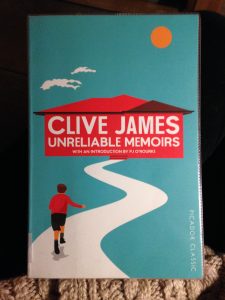Clive James is a man I knew very little of when I set about reading his book, ‘Unreliable Memoirs.’ I had vague memories of him hosting a late-night TV chat show but that was about the extent of my knowledge of the man.
The blurb on the back looked promising: espousing much laughter to be had and so I started with a positive feeling. The forward was a little off-putting, the writer of which seemed to be so infatuated with James that you felt awkward, as if intruding on a zealous intimacy for which you were not a part of and the term, over-egging it, would certainly not seem strong enough. 
The concept of the book, as far as I understand, was that it was a spur-of-the-moment recollection of his childhood, intended to imbue a feeling of the place and time of his early years. He seems to imply that it was not, perhaps, even intended for publication, and yet I don’t believe this. However, after reading it I can’t understand why anyone would want this documentation public about themselves, or even why anyone would want to read it. It does not leave the reader with a pleasant perception of the author.
In its essence, the account could be summed up by saying that it was a list of rather unpleasant thoughts, deeds and actions undertaken by the young James for which he seemed to have no remorse, either then or now. The phrase, ‘psychopathic tendencies’ cropped up in our book club discussion on more than one occasion.
A large portion of the storytelling seemed to involved, shall we say politely, an awful lot of intimate self, and shared with his peers, gratification. There was a lot of it. Growing up as one of four girls, I wondered if this was perhaps a male tendency, ‘normal’ in the developing years of boys: I was assured by a male member of the book club that this was not the case.
Destructive behaviour and self-aggrandisement was the other over-arching theme of the book and it was his poor mother who seemed to take the brunt of it. His father died when he was young and the only other male role-models in his life, also passed away in his early years. Whether this had an impact on his behaviour (and you can only imagine that it did), James did not actually address in his memoire. He grew up, just him and his mother at home, which you would think would have made him close to and considerate of the woman who did everything she could for him. But no. He flagrantly broke, destroyed, rebelled, wilfully deceived and derided his way through life.
The book followed James through his early years to the moment he left for England as a young adult. Throughout this time he was part of various clubs and groups, jobs and military service. In all, he portrayed himself as the great storyteller, admitting to the reader that much of what he told was outright lies to bolster his popularity. It is because of this, I can’t help but wonder, whether this book itself is just another of his tall-tales, fabricated to cover insecurities or boost his self-esteem: it is called Unreliable Memoirs after all.
I’m sorry to say that overall, the book left me very disappointed and somewhat ill-at-ease. I wasn’t sure whether we were reading about a real person at all and if so, was it one who was so desperately hurt and unsure of themselves they created a whole hideous persona to cover their deep insecurities, or was it someone who genuinely needed/needs some mental health help.
It was a shame, because I was under the impression that Clive James was a skilful man with words and there were fleeting and rare moments in this book where this could be glimpsed. But if you took those far-too-few beautiful and exciting descriptions and put them all together, they would possibly have made three pages.
I asked all the members of the book club, out of five stars, what they would give Unreliable Memoirs, each gave it two.
‘Unreliable Memoirs,’ by Clive James: two out of five stars. Sadly, not recommended.